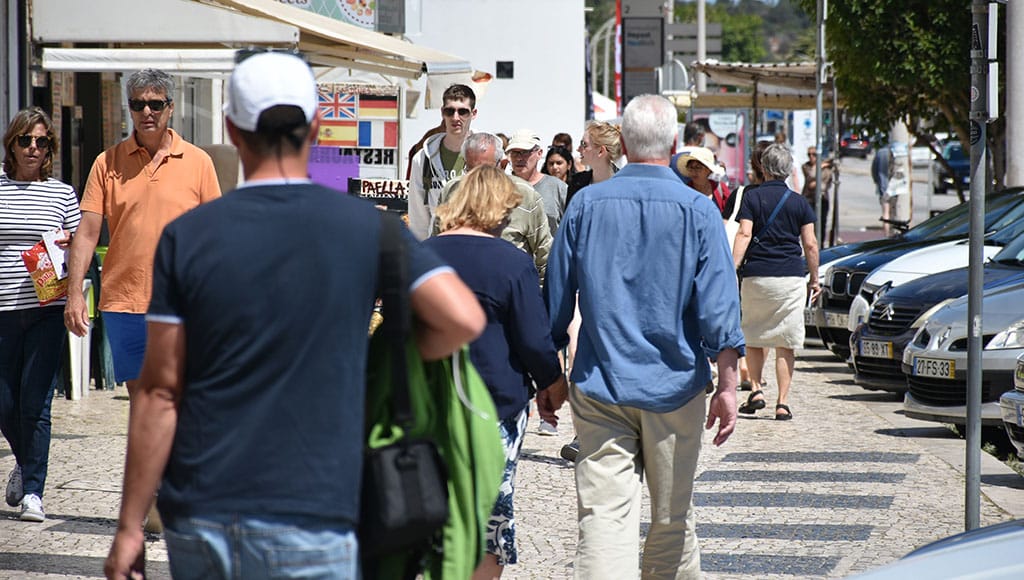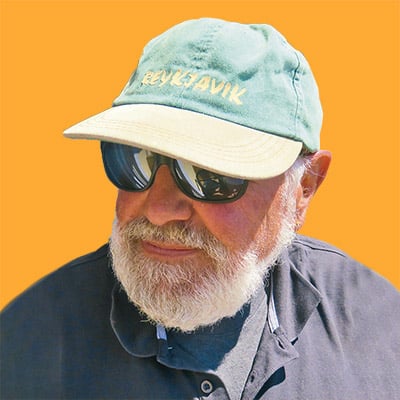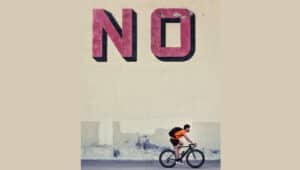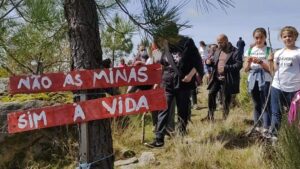Most of you who are reading this column right now in The Resident, the leading English-language newspaper in the Algarve, are, in fact, residents. (Hence the name, actually.)
As such we have pretty strong opinions about another large group of people who can be found along the southern coast of Portugal. That group is called “tourists.” For example, we’re pretty quick to point out that “we’re not tourists.” Of course, the Portuguese don’t really need to make such distinctions even if they’re down here from Lisbon for a long weekend. It’s the expats, who look quite a bit like tourists, who often feel the need to differentiate residential status. Okay, so yes, we’re wearing Skechers, very comfortable walking shoes, but who isn’t these days. (Our crocs are in the back of the closet now.) And yes, we’re a large cohort of adult and even elderly men, who wear short pants every day, year-round. And no, we haven’t mastered the Portuguese language yet, but we’re trying. So even before we were eventually granted our residency cards, many if not most wanted to draw a clear distinction between righteous people who actually live here in this region and those less than gracious visitors who are passing through in tour buses or cars with foreign license plates.
I’ve been thinking about this quite a bit lately because my lovely wife and I recently went on a 10-day trip to the Amalfi Coast of Italy (making us absolute tourists), and due to the fact that tourism and tourists in general have been in the news rather often lately, mostly in a negative light. So is it a positive thing to be a tourist when it is you yourself, but quite an opposite and negative force when it is somebody else? Obviously, it all depends, but what I want to discuss is “on what?”
It is easy to stereotype and therefore be prejudiced about tourists. It is also important to remember that the Algarve is a region that relies on something called “the tourist industry” with the majority of businesses relying on the custom of people showing up for overnight stays. It is a service economy based on providing accommodations, food and drink and recreational opportunities to people who have no intention of residing in the area. They’re just passing through but on purpose, with the intention of wandering our streets, looking at our buildings and churches and occupying every square foot of sand at our local beaches.
The conclusion, that I’ve arrived at, is that for many locations around the world, the main problem is that the shear number of tourists is becoming overwhelming. For instance, it has been reported in the media lately, that there is growing frustration among New Englanders in the U.S. with the huge influx of “leaf peepers,” people who drive slowly down country roads gazing appreciatively at the magnificent colors of the changing autumn foliage. For some locals, they didn’t move to rural Connecticut to be trapped in their driveways by a traffic jam of RVs.

There are numerous travel articles lately about “tourist traps” that the discerning traveler might want to avoid. Like the Colosseum in Rome. Hey wait a minute, the Colosseum is a must-see attraction the first time anybody visits Rome. I remember when we did about 25 years ago. There were plenty of sightseers with guides vying for the best views, but it wasn’t that difficult to squint out the groups and picture an ancient amphitheater. Today it’s not so easy, with endless queues of colorful tee shirts shuffling along every level. Also decades ago, my wife and I hired an ATV on the island of Santorini and drove out west to witness the sunset as recommended. We sat at a nice little café table and enjoyed a glass of wine as we gazed at the colorful horizon. The trip back at night on our motorized tricycle was a bit harrowing as tour buses skirted by but at least we didn’t have to stand crammed shoulder to shoulder along the western cliffs in an attempt to get a glimpse of the sun going down. And of course, there’s Machu Picchu. My lovely wife and I were lucky enough to stay at the lodge on top and entered the gate at sunrise. It was truly mystical, with rays of sun bursting through the clouds below us. Why was it so nice? No people—just us and our peaceful thoughts. The groups came later with guides holding up unopened umbrellas over their heads. So it seems that even as a tourist one of the main ways to maximize enjoyment is to avoid other tourists.
Even locally, most of us stay away from the beaches and towns like Lagos, with its straightaway main road of stoplights, and especially Albufeira, where every night is stag night, during the high-season months of July and August. Why? Well, for one thing, parking is impossible. We took visiting friends over to Faro Beach, (it might have even been June) and we ended up driving from one end of the island to the other, after waiting three turns to cross the single-lane bridge, without even spotting a space. So, we left, as did a number of others in our line.
During high season (which I also call “hot season”), our local road the N 125 is a parking lot for much of the day into the night, when it earns its nickname of “Road of Death” with way too many partiers trying to drive to just one more bar. I’m really curious to see what effect lifting the tolls from the A 22 will have on safety. I wonder if it will just make the highway more dangerous, with the drunks driving faster.
Our driver/guide while in Sorrento, Italy seemed to have some fairly strong opinions based on extensive experience. His summary of the problem with tourists was fairly succinct—“Way too much stupid.” While on that trip, we did witness two different women step off the curb without looking and into our path. Maybe they were Brits and not used to the traffic coming from the other direction. I know that’s a worry in the opposite direction when I’m in London. During a pit stop, we witnessed a guy in a baseball cap, who apparently was in the process of renting a motorbike. His wife didn’t seem very anxious to hop on, since he looked more than a little wobbly on the test drive. A few minutes later, we spotted the same guy being pulled over by a police officer. Claudio, our driver, noted “He’s not wearing a helmet.” Apparently, the cap wasn’t enough according to the law.
Lately, we’ve all seen news reports of ill-advised visitors to national parks trying to get selfies with moose, elk, bison, bears and geysers even. Not smart. Apparently, park rangers have come up with a new term for these accident-prone patrons. They seem to richly deserve being referred to as “Tourons” as they faint while posing next to a thermometer posting 135F degrees in Death Valley.
Even along the coast of Portugal, orcas seem to be getting impatient with recreational sailors, bringing to mind their nickname Killer Whales. Tourist taxes, which are becoming more and more prevalent among municipalities, are evidence that there are limits to how many resources coastal cities and towns have available to deal with rampaging hen parties and caravans parked on cliffs with no toilet facilities nearby.
Actually being a tourist doesn’t look like that much fun anymore, at least not to an old guy like your favorite travelling companion good ol’Pat. My lovely wife and I reached retirement age so long ago I can’t remember. So now we’re trying to spend the inheritance as we speak and to be honest there are things we just won’t do any more. Buses for example. It’s not just that they’re difficult to climb up into either; we just don’t want to be stuck with people who ask silly questions and/or can’t remember the designated departure time. Of course, it’s not everybody. There are plenty of intelligent, thoughtful, fun people hidden behind the high-back seats, but they’re not the ones the rest of us are waiting for, are they? A friend of mine was a guide in Washington, D.C. many years ago and while touring Arlington National Cemetery, somebody asked why Jackie wasn’t buried next to her husband JFK in front of the eternal flame. The answer was pretty simple at the time—she wasn’t dead yet.
From the airport on, there is a worried look on most of the fellow travellers that I observe. They all seem sure that their reservation won’t be honored; their baggage will be lost; they’ll get arrested at security; they won’t be allowed on the plane, so they huddle around the gate, way before their group is called even though they have a numbered ticket; and that the plane will probably crash. Of course all that is possible, but unlikely, but don’t tell those backpackers in front of you, who seem determined to stuff that huge piece of “carry-on” into the overhead compartment.
Walking is another thing we don’t do any more. I guess what I really mean is hiking–going long distances for hours on foot. There’s a popular three-day hike that many pilgrims take up to Machu Picchu. We took the train. Our favorite way to get around places like Lisbon, Amsterdam or Ljubljana is jump on a tuk-tuk, with usually just room for us and the often enthusiastic drive/guide, who usually gets us close to where we’re going. During our most recent holiday, we stayed in the Italian hillside town of Ravello, which is pedestrian only. After we walked a few blocks to meet our driver for the day’s excursion, we passed large troops of trudging tourists with no choice but to tramp uphill for a quarter to a half a mile. I saw few smiling faces among the forced marchers. There’s a desperation to have fun based on the expense or limited time due to few vacation days or a primal need to publish “happy” photos on Facebook. But to me, lots of tourists look and act anxious.
In summary, there are simply too many memory-makers vying for the best spots to video tape a finite number of postcard views. I do recall once waiting in line to take my turn stepping off the curb to photograph an ideal angle of Big Ben. To date, I estimate that it is possible that over a million people have taken that exact same snapshot of a famous London landmark. For places like the Algarve, whose main goal is to continue to be a major tourist attraction, most businesspersons will tell you the more the better. They might not be correct.
One final personal bias about tourists, that I didn’t have until I lived in the historic old section of Panama City called Casco Viejo, which is an Unesco World Heritage site. Every day, we had groups from the cruise ships wander by hoping to find a public restroom that didn’t exist. Every one of them was wearing what I call silly hats. Naturally some had on baseball style caps, which really aren’t that silly, but others had on safari hats, with flaps in the back. I’ve even see pith helmets and plenty of Australian bush hats. I mean Panama hats make much more sense and even they are mostly made in Ecuador (little known fact). I saw women and some guys with visors the size of Madeira and the rest in massive sun hats that could double as beach umbrellas. It was an unspoken rule, but most of my friends and I seldom wore hats, except out on the golf course–just sunglasses. The reason I think was because we did not consider ourselves and didn’t want to be considered tourists.
By Pat the Expat
|| features@algarveresident.com
For the previous 10 years, Pat lived in Panama which used to be rated above Portugal as a top retirement destination (but not any more), where he wrote a column for a tourist publication.




















